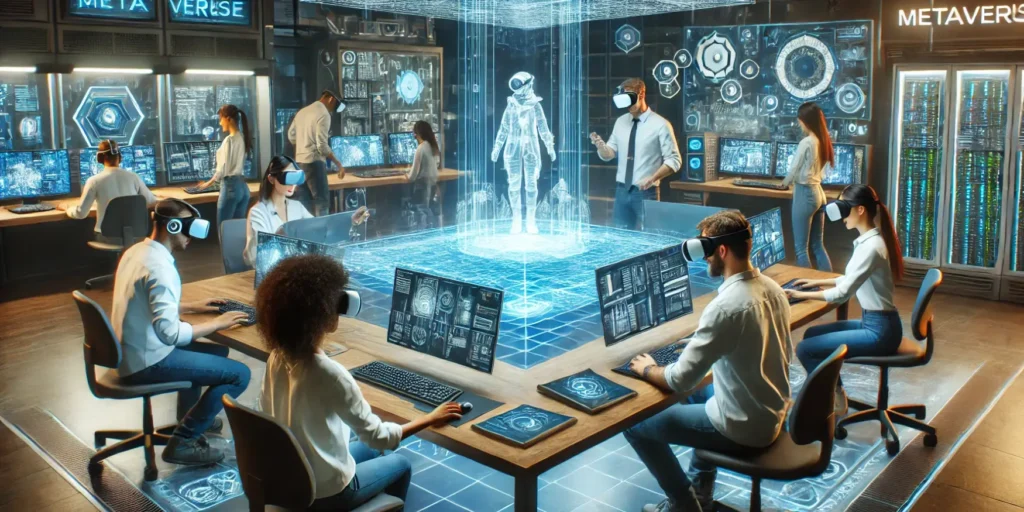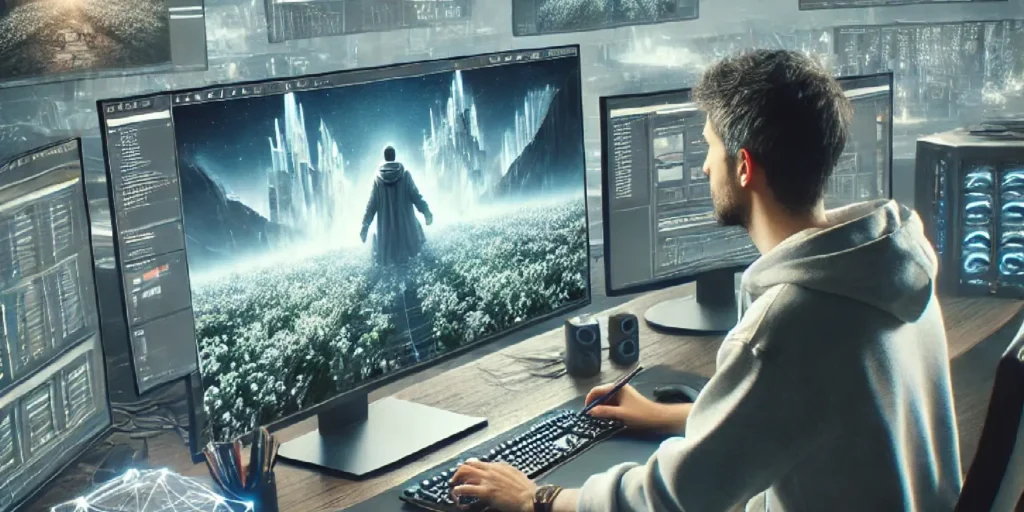Table of Contents
Introduction:
In the ever-expanding universe of digital innovation, the concept of the metaverse stands out as a transformative evolution, redefining how we perceive, interact with, and shape our virtual and physical realities. The metaverse, a complex network of 3D virtual worlds where users interact socially and economically as they would in the real world, is gaining momentum as the next frontier in internet and technology development. This digital cosmos is built on the foundation of advanced technologies such as augmented reality (AR), virtual reality (VR), and artificial intelligence (AI), each playing a pivotal role in crafting immersive and interactive experiences that go beyond the constraints of physical space.
As we delve into this burgeoning digital landscape, understanding the tools and technologies that enable the creation and expansion of the metaverse is crucial. From game development engines like Unity and Unreal Engine to proprietary platforms developed by tech giants such as Meta, these technologies are not just facilitating the creation of virtual spaces but are also setting the stage for a new era of digital interaction that could one day mirror the complexity of the real world. Whether you are a developer, a designer, or merely a tech enthusiast, this blog will guide you through the top tools and technologies driving metaverse development, offering insights into their capabilities, applications, and the future they are helping to shape.
Understanding the Metaverse
What is the Metaverse?
The metaverse represents a collective virtual shared space, created by the convergence of virtually enhanced physical reality and persistent virtual spaces. It promises a new ecosystem where digital and physical realities coalesce in a shared online space accessible via the internet. This digital universe is built on the backbone of advanced technologies such as VR, AR, and AI, supporting a network of 3D virtual worlds focused on social connection. Unlike traditional virtual reality experiences, the metaverse offers a persistent environment where actions and events continue to occur even when users are offline. It is envisioned as a fully-functional ecosystem for businesses, social outlets, and entertainment platforms, where digital avatars and assets can interact and evolve.
The Rise of Virtual Worlds and Immersive Experiences
The rapid advancement in technology has enabled the creation of more sophisticated and immersive virtual worlds. These environments are increasingly sought after for a variety of applications, from entertainment and social interaction to education and remote work, fueling the growth of the metaverse. The accessibility of high-speed internet, powerful computing smartphones, and more affordable VR headsets has democratized access to these virtual spaces. As a result, industries such as real estate, tourism, and retail are exploring virtual reality to offer experiences that mirror the physical world but with the limitless possibilities provided by digital enhancements. This evolution is not just changing how we interact with digital content, but it’s also reshaping societal norms around social interactions and professional collaborations in digital spaces.
The Importance of Metaverse Development
Metaverse development is crucial as it provides the infrastructure and platforms that support scalable, immersive, interactive, and secure virtual worlds. This development is foundational in shaping how individuals will interact with digital environments and each other in real-time. For the metaverse to function as a cohesive unit, it requires a robust framework capable of supporting countless simultaneous users, managing vast amounts of data, and ensuring a seamless and uninterrupted experience. This infrastructure must not only handle the complexities of virtual economies, including transactions and asset ownership but also address privacy, security, and ethical considerations. The development of the metaverse is therefore a significant endeavor that combines elements of network engineering, software development, and user experience design to create environments that could one day mirror the complexity of the real world.

Unity: Empowering Metaverse Creators
Introduction to Unity and its Role in Metaverse Development
Unity has become a cornerstone in the realm of interactive and immersive digital experiences, crucial for metaverse development. Known for its extensive adaptability across different digital platforms—ranging from mobile devices to desktops and VR headsets—Unity offers developers a unified environment to create, test, and deploy immersive experiences. Its comprehensive ecosystem supports both 2D and 3D development, making it an invaluable tool for building diverse virtual environments that can be as vast as entire worlds or as detailed as micro-interactions within those worlds.
Key Features and Capabilities of Unity for Building in the Metaverse
Unity’s real-time development capabilities are essential for metaverse environments where user interactions need to occur without lag or disruption. The platform’s robust suite of tools, including physics engines, 3D rendering, and custom shaders, allows for the creation of highly realistic environments. Additionally, Unity’s collaboration features enable teams spread across different geographies to work simultaneously on the same projects, thereby streamlining the development process and reducing time to market for new metaverse features.
Success Stories and Examples of Unity-Powered Metaverse Projects
Numerous metaverse platforms leverage Unity to deliver compelling and engaging user experiences. For instance, educational metaverse applications built on Unity have enabled interactive learning environments where students can experiment with physics in a virtual lab or visit historical sites in virtual reality. Similarly, Unity has powered large-scale entertainment projects, providing the backbone for virtual concerts and events that offer interactive and immersive fan experiences, showcasing the platform’s capability to handle large user volumes and complex interactions.
Unreal Engine: Pushing the Boundaries of the Metaverse
Exploring Unreal Engine's Impact on Metaverse Development
Unreal Engine is synonymous with top-tier visual quality and has been a driving force in the development of photorealistic environments that are critical for the next generation of the metaverse. Its ability to produce high-quality lighting and shadow effects allows developers to create virtual spaces that can be virtually indistinguishable from real life. This level of realism is particularly important in scenarios where user immersion is key to the experience, such as in virtual real estate tours or high-stakes training simulations for medical and military applications.
Advanced Features and Tools for Creating Immersive Metaverse Experiences
Beyond its graphical capabilities, Unreal Engine offers a suite of advanced development tools designed to enhance the interactivity of virtual environments. These include comprehensive AI functionalities for character behavior, robust support for complex animations, and an interactive audio system that can dynamically respond to user inputs and environmental changes. These tools are critical for developing a metaverse where user engagement and retention require not only visual appeal but also interactive depth.
Real-world Applications of Unreal Engine in the Metaverse
Unreal Engine’s impact on metaverse development can be seen in sectors ranging from gaming to enterprise solutions. For example, it has been used to create interactive training environments for aerospace engineers, providing them with a risk-free platform to simulate repairs under various conditions. In the entertainment industry, Unreal has powered virtual production sets, blending real-world and CG elements in real-time to create immersive broadcasting experiences.
Virtual Production Using Unreal
One of the most groundbreaking applications of Unreal Engine in the realm of metaverse development is virtual production. This technique merges real-time rendering with traditional filmmaking to create dynamic and visually rich environments for film and television production. Virtual production using Unreal Engine allows directors and cinematographers to see their scenes unfold in real-time as they are filmed against green screens. This not only helps in making immediate adjustments to lighting, effects, and camera angles but also significantly reduces post-production time and costs. Furthermore, the same tools and assets developed for virtual production can be directly utilized within the metaverse, providing a seamless bridge between the worlds of filmmaking and virtual reality.

Proprietary Tools from Meta and Other Companies
Meta's Contribution to Metaverse Development
Meta, formerly Facebook, has positioned itself as a pioneer in the social aspects of the metaverse with its investments in Oculus VR technology and virtual platforms that emphasize human connections. By focusing on creating interconnected virtual spaces that support social interactions, Meta aims to extend its social networking prowess into the third dimension, offering more engaging and lifelike ways for users to connect, share, and collaborate.
Overview of Meta's Proprietary Tools and Technologies
Meta’s suite of VR and AR tools, including the Oculus Quest headsets and the Horizon platform, underscore its commitment to building a comprehensive ecosystem for the metaverse. These tools are designed to integrate smoothly with each other, providing a seamless experience from social VR applications to collaborative workspaces that mimic real office environments, thereby facilitating a transition to a more immersive internet.
Other Notable Companies and Their Metaverse Development Solutions
While Meta focuses on social VR, other tech giants like Microsoft and Google are exploring different facets of the metaverse. Microsoft’s Mesh aims to create a seamless collaborative platform for enterprise users, integrating with its cloud computing services and productivity software to offer a new mode of remote work. Google, on the other hand, has focused on enhancing its AR capabilities through ARCore and other initiatives that integrate digital information with the physical world, promoting more practical and utility-driven applications of metaverse technologies.
Emerging Tools and Technologies in Metaverse Development
Upcoming Innovations and Trends in the Metaverse Landscape
The metaverse is poised to be dramatically transformed by emerging technologies such as artificial intelligence, which can drive more dynamic and responsive virtual environments. Innovations like machine learning models that predict user behavior or AI-driven content curation can greatly enhance the personalization and efficiency of metaverse platforms. Additionally, the integration of blockchain technology is setting new standards for how virtual assets and user identities are managed and secured, paving the way for more robust economic systems within the metaverse.
Open-source Tools and Frameworks for Metaverse Development
The rise of open-source tools in metaverse development democratizes access to sophisticated development capabilities. Godot, for instance, offers a powerful yet cost-effective alternative to mainstream commercial engines, ideal for independent developers or small studios looking to enter the metaverse space. Its lightweight design and flexible scripting language make it suitable for a wide range of metaverse applications, from simple virtual galleries to complex interactive learning environments.
NFTs, Blockchain, and their Role in the Metaverse
Non-fungible tokens (NFTs) and blockchain are rapidly redefining the concept of ownership and trade within the metaverse. NFTs enable users to own unique digital assets, from artwork to virtual real estate, with blockchain technology ensuring transparency and security in these transactions. This cryptographic approach not only enhances user trust but also opens up new avenues for creators to monetize their work directly in the metaverse, fostering a thriving digital economy.

Choosing the Right Tools for Your Metaverse Project
Factors to Consider When Selecting Metaverse Development Tools
Choosing the right set of tools for metaverse development hinges on various factors, such as the intended scale of the project, the target audience, and the specific functionalities required. For instance, projects aimed at massive multiplayer experiences may prioritize scalability and network stability, while those focused on delivering high-end corporate training might emphasize graphical fidelity and interactivity.
Comparing Unity, Unreal Engine, and Proprietary Solutions
The choice between Unity, Unreal Engine, and proprietary tools often comes down to the specific needs and goals of the project. Unity is renowned for its ease of use and extensive community, making it a great choice for developers new to the metaverse space. Unreal Engine is preferred for projects requiring top-tier visual effects and complex user interactions. Proprietary tools, while potentially offering optimized solutions for specific platforms or use cases, might involve higher costs or more specialized knowledge.
Tips for Getting Started with Metaverse Development
For those new to metaverse development, it is advisable to start with accessible projects that build foundational skills. Engaging with online communities, participating in workshops, and experimenting with different tools can provide practical experience and valuable feedback. As skills and understanding grow, developers can gradually tackle more complex projects, potentially specializing in niche areas of the metaverse that align with their interests and expertise.
Conclusion
The journey through the diverse landscape of tools and technologies for metaverse development underscores the vast potential and the dynamic nature of this digital frontier. Unity and Unreal Engine offer robust platforms for creating immersive experiences, while proprietary tools from companies like Meta are pioneering new ways to interact within these virtual environments. As we look to the future, the ongoing innovations in AI, blockchain, and open-source development promise to further revolutionize the metaverse, making it more accessible, secure, and engaging for users around the globe.
For developers and creators, choosing the right tools will be instrumental in defining the contributions they can make to this virtual universe. Immersive Skills Academy is at the forefront of this educational evolution, offering comprehensive courses in AR VR, and metaverse development that are designed to equip new talent with the skills needed to excel in these fields. As the metaverse continues to evolve, staying informed and adaptable will be key to leveraging its full potential. By understanding and utilizing these powerful tools, developers not only have the opportunity to pioneer new digital experiences but also to shape the future of how we live, work, and play in an increasingly digital world. Embrace these technologies, engage with the community, and with the help of institutions like Immersive Skills Academy, you may find yourself at the forefront of the next digital revolution—crafting experiences that were once the realm of science fiction.

